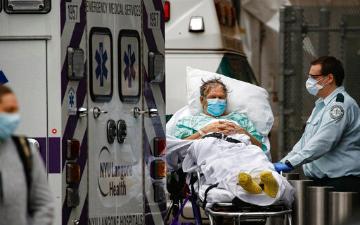
(ASSOCIATED PRESS/John Minchillo)
David E. DeCosse is the director of the Religious & Catholic Ethics and Campus Ethics programs at the Markkula Center for Applied Ethics. Views are his own.
Here are five ethical basics for understanding decisions in hospitals about rationing and triage in this time of the COVID-19 pandemic.
A Pandemic Makes Its Own Rules
In the usual medical state of things in America, there are colds and cancers, broken bones and bad wounds. Kidneys are rationed because patients who need transplants outstrip the number of donated organs. Doctors in busy urban emergency rooms have to prioritize whom to treat in a process called triage—some may have to wait but all will get seen. But then there is a pandemic. As a medical phenomenon, a pandemic shatters assumptions carried over from the usual state of things. A virus spreads readily within groups and across borders. The novel genetic nature of the virus means the usual treatments often don’t work: They haven’t caught up to the renegade microbe. Plus, the disease caused by the new virus can be fatal. Left to itself, a novel virus that causes a pandemic can produce so many sick patients in such a short time that almost any hospital can be overwhelmed. There are not enough health care workers, medicines, or pieces of equipment to meet the sudden, shocking demand. In the developed world, we are unfamiliar with such scarcity. In poorer nations, such scarcity is closer to the norm.
The Focus of Medical Ethics Shifts
In a situation of such radical scarcity, the focus of medical decision making shifts. In a normal visit to the doctor, the rule of thumb for a physician is to do all one can for the patient in front of her. In a pandemic, the governing rule can become: “save as many lives as you can.” Rationing decisions have to be made about hospital bedsand ventilators: What will be assigned to which sick patient amid the overload of sick patients? Triage choices have to be made too: Which COVID-19 patients are most likely to survive as a result of treatment? Which COVID-19 patients have serious underlying illnesses—for instance, cancer or tuberculosis—that make survival less likely?
Save as Many Lives as You Can
The rule to “save as many lives as you can” prioritizes survival and the equal value of every human life. It says: “Our main goal is to keep alive as many human beings as possible and we will respect every patient equally in that regard: A rich person’s potential to live should not be favored more than a poor person’s potential to live.” This rule also does not rely on standards like age and quality of life as singular measures for determining who gets treated. The age alone of an elderly person doesn’t mean she is less entitled to care than a younger patient. At the same time, an elderly person being older may have developed diseases that make her less likely to survive and thus less entitled to treatment compared to any person without such diseases.
Save the People Who Do the Saving
Saving as many lives as possible can also lead to what may seem like a surprising priority: To save the lives of health care workers without whom no one else’s life could be saved. And, beyond health care workers, this prioritization might also apply to public safety officers, food workers, and others necessary for the functioning of the bare-bones society that can result from a pandemic. In the coronavirus pandemic, health care workers have acted with a remarkable commitment to their duty to care for the sick. They have often done so without benefit of necessary protective equipment. Many have died as a result of this commitment. The medieval Catholic theologian St. Thomas Aquinas had such workers in mind when he said one of the most admirable examples of courage was the person who would “not fail to attend on a sick friend through fear of deadly infection.”
Choices: Past and Present
A pandemic makes clear that the health care choices we face in the agonizing present are shaped by personal and policy-based health care choices made in the past. Thus the choice for social distancing reduces the rate of infection and can decrease the future possibility of a sudden, overwhelming strain on a hospital. But past policy choices can also bear hard on the present. The United States has chosen not to provide health insurance to all of its citizens. Millions of Americans have worse health without such insurance: They get and stay sick because they don’t go to a doctor because they can’t afford to. When they face triage in this pandemic in a jammed hospital, they may not be entitled to treatment because of serious underlyingillness that undermines their chances to survive COVID-19 and that could have been prevented if they had had health insurance. A pandemic is ruthless about the devastation it inflicts and the injustice it exposes.